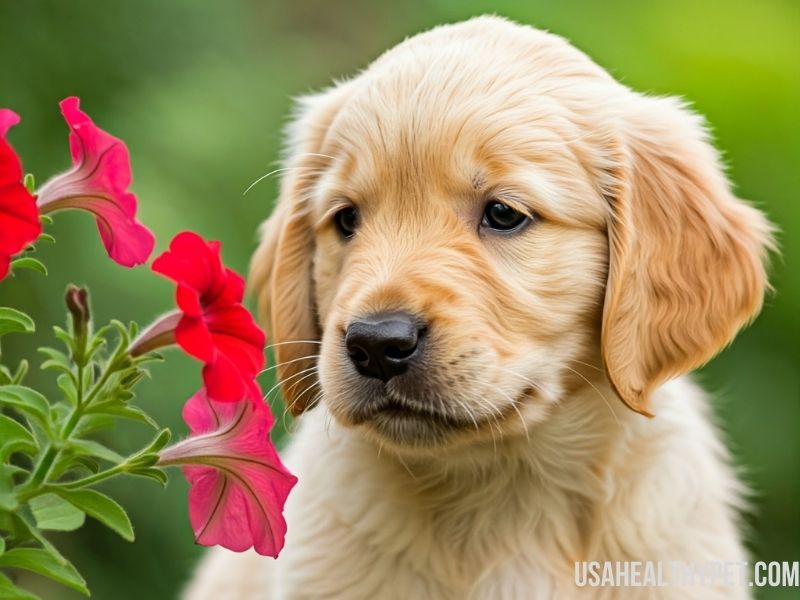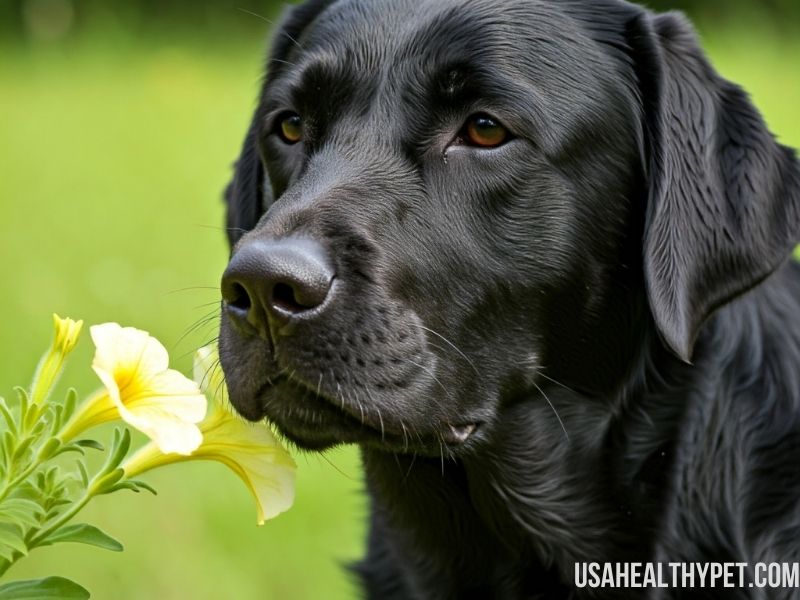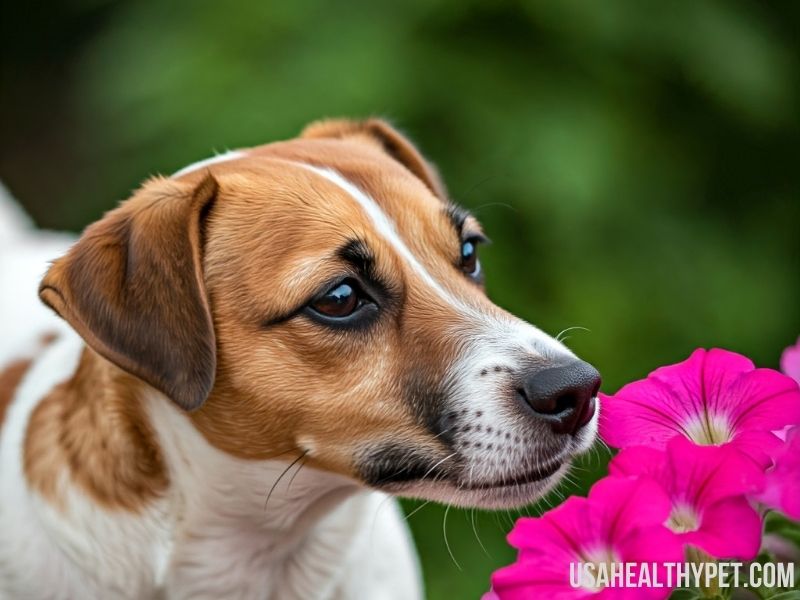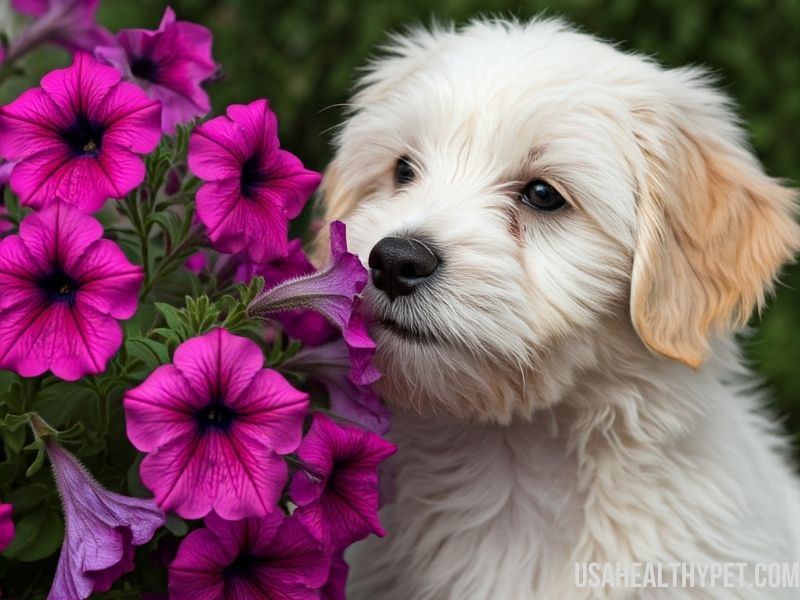If you love gardening and own a dog, you’ve probably wondered, “Are my plants safe for my dog?” After all, dogs don’t always have the best judgment when it comes to what they nibble on.
Today, we’re diving into the world of petunias, those beautiful and vibrant flowers that many of us enjoy planting in our gardens or pots. But the big question is: Are petunias toxic to dogs? Let’s find out!
What Are Petunias?
Before we get into the dog-related stuff, let’s take a quick look at what petunias actually are. Petunias are popular flowers known for their bright, trumpet-shaped blooms.
They come in a variety of colors like purple, pink, white, and red, and are commonly used in gardens, window boxes, and hanging baskets.
These flowers are pretty low-maintenance, making them a favorite among both beginner and seasoned gardeners.
Are Petunias Toxic to Dogs?
Petunias are not toxic to dogs. Unlike some plants that can be harmful or even deadly to dogs, petunias are actually classified as non-toxic by the ASPCA (American Society for the Prevention of Cruelty to Animals).
This means that if your dog happens to take a bite of a petunia flower, there’s no need to panic.
However, just because petunias are non-toxic doesn’t mean they should become part of your dog’s diet.
Eating plants in general can upset your dog’s stomach, even if they’re safe. So, while petunias won’t poison your pup, it’s still best to keep an eye on them in the garden.

Why Some Plants Are Harmful to Pets
Plants produce a variety of chemicals to protect themselves from being eaten by animals or pests.
Some of these chemicals can be harmful to dogs, cats, or other animals.
For example, plants like lilies and oleander are highly toxic to pets because they contain compounds that can affect the heart, liver, or kidneys.
Thankfully, petunias don’t have any of these harmful chemicals, making them a much safer option.
Symptoms of Plant Poisoning in Dogs
Even though petunias are safe, it’s good to know the common signs of plant poisoning in dogs, just in case they munch on something they shouldn’t. If your dog consumes a toxic plant, you might notice:
- Vomiting
- Diarrhea
- Drooling
- Lethargy
- Difficulty breathing
- Seizures
If you see any of these symptoms after your dog has been around plants, it’s time to call your vet.
What to Do if Your Dog Eats a Toxic Plant
Accidents happen, and if your dog does eat a toxic plant, it’s important to act quickly. First, remove any remaining pieces of the plant from their mouth.
Then, call your vet or a pet poison helpline immediately. They’ll ask for details about the plant and your dog’s size to give you the best advice.
Pro tip: Keep the ASPCA’s Animal Poison Control number handy in case of emergencies. It’s always better to be prepared!

Petunias and Dogs: Real-Life Scenarios
Imagine this: It’s a sunny day, and you’re outside in the garden planting petunias. You turn your back for one second, and suddenly your dog is sniffing around, taking a curious nibble.
While it might give you a bit of a scare at first, remember, petunias are safe. So, no need to rush off to the vet! Just keep an eye on your pup to make sure they don’t get an upset stomach from all that munching.
Safe Gardening with Dogs Around
Now that we know petunias are safe, let’s talk about how you can create a dog-friendly garden. While petunias may be fine, not all plants are. So, what can you do to keep your garden beautiful and safe for your pup?
- Research your plants: Make sure any flowers, shrubs, or trees you plant are non-toxic to dogs.
- Use raised beds or fences: This can help keep your dog out of the garden entirely.
- Supervise your dog outside: If your dog loves being outside with you, keep an eye on them to make sure they don’t munch on something harmful.
According to the University of California’s Division of Agriculture and Natural Resources, one of the easiest ways to prevent plant-related accidents is to ensure you’re planting dog-safe species.
Plants That Are Toxic to Dogs: A Quick Look
Here are a few common plants you should definitely avoid planting if you have dogs:
- Lilies
- Tulips
- Azaleas
- Oleander
- Sago palm
These are just a few examples of plants that can be harmful to dogs, so it’s always a good idea to do your research before adding new plants to your garden.
Non-Toxic Alternatives to Petunias
While petunias are safe, you might be looking for some variety in your garden. Here are a few other non-toxic flowers that are safe for dogs:
- Marigolds: These bright, cheerful flowers are not only safe for dogs but can also help repel pests.
- Snapdragons: Colorful and dog-friendly, snapdragons make a great addition to any garden.
- Sunflowers: If you want to go big and bold, sunflowers are a safe option for dogs and add a striking focal point.
Dr. Jamie Richardson, explains, “Dogs are curious by nature, and some may develop a habit of chewing on plants. Even non-toxic plants like petunias can cause mild stomach upsets. It’s always best to provide safe chew toys and training to discourage plant-eating.”
How to Dog-Proof Your Garden
Dog-proofing your garden isn’t just about picking safe plants. Here are some extra steps you can take to make sure your garden is a safe space for your furry friend:

- Choose pet-safe fertilizers and pesticides: Many common garden products can be harmful to dogs, so make sure you’re using ones that are pet-friendly.
- Secure your compost bin: Dogs can be curious about compost, but some food scraps and decomposing plant matter can be dangerous for them.
- Provide a safe digging area: If your dog loves to dig, giving them their own spot can help protect the rest of your garden.
Tips for Dog-Friendly Gardening
- Plant in raised beds: This keeps plants out of reach and gives your garden a tidy look.
- Create a dog-friendly play area: Set aside a part of your yard where your dog can roam freely without damaging plants.
- Install barriers: Low fences or garden borders can help keep your dog out of certain areas.
Final Thoughts: Should You Worry About Petunias?
In short, you don’t have to worry about petunias if you have a dog. They’re one of the many non-toxic plants that are safe for our furry friends. Of course, like with anything, moderation is key.
It’s best to discourage your dog from eating plants in general, even if they aren’t toxic, just to avoid any potential tummy troubles.
Conclusion
Petunias are a lovely, safe option for gardeners with dogs. So, the next time you’re picking out flowers, feel free to add these colorful blooms to your yard without fear.
Just remember to dog-proof your garden and choose pet-safe plants to create a beautiful and worry-free outdoor space.
FAQs About Petunias and Dogs
1. Can dogs eat petunias?
Yes, petunias are non-toxic to dogs, but it’s still a good idea to discourage them from eating any plants.
2. Are all varieties of petunias safe for dogs?
Yes, all common varieties of petunias are considered safe for dogs.
3. What should I do if my dog eats a petunia?
While petunias aren’t toxic, monitor your dog for any signs of stomach upset, like vomiting or diarrhea.
4. What are some other non-toxic flowers I can plant?
Safe options include marigolds, snapdragons, and sunflowers.
5. How can I make my garden safer for my dog?
Choose non-toxic plants, use pet-safe garden products, and create barriers to keep your dog away from harmful areas.
